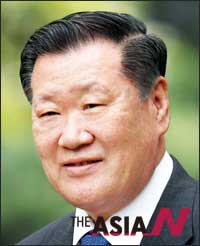Hyundai Motor chairman calls for emergency mode
Hyundai-Kia Automotive Group Chairman Chung Mong-koo Monday urged heads of the group’s overseas branches to find ways of minimizing any impact the eurozone debt crisis could have on the group’s sales across Europe and other regions.
“We should prepare for measures in advance to cope with the possibility that the Eurozone crisis has an impact on our overseas markets, reflecting the different situation in each market zone,” Chung said during a meeting with heads of overseas branches.
Believing it could also be a challenging time for the automaker group Chung requested that a regular meeting be held a month earlier than originally scheduled because the eurozone crisis showed signs of prolonging.
Early this month, Chung also sent a group of executives to Europe so that they could examine the situation there and come up with plans to tackle possible difficulties.
Hyundai Motor vice chairman Chung Eui-sun and Kia Motors vice chairman Lee Hyung-keun each visited its European sales and production operations to prepare new strategies to minimize the impact of the eurozone crisis.
The 74-year-old chairman also emphasized the importance of improving customer services and the quality of their products as the keys to tackling difficulties they may face, although the Korean auto giant continues to show strong growth in overseas markets.
Demand for new passenger cars in Europe plunged for the eighth consecutive month in May, according to the European Automobile Manufacturers’ Association, with the total number of newly-sold vehicles at 5.64 million, 7.3 percent down from the same period last year.
But Hyundai and Kia sold 327,000 units, 15.7 percent up from the previous year, which increased the market share of the two automakers in Europe to 5.8 percent.
In other global markets such as the U.S. and China, they sold 2.96 million cars, 13.8 percent up from the previous year.
But to maintain high sales in overseas markets, Chung noted that it is critical to minimize the impact of the eurozone crisis, which has triggered concerns over recession in the global automotive industry.
“So far, it has been good for us,” he said. “But it will be more critical from now on to decide how we should prepare for the coming years. We should tackle difficult obstacles with more creative strategies.” <The Korea Times/Kim Tae-jong>


























































